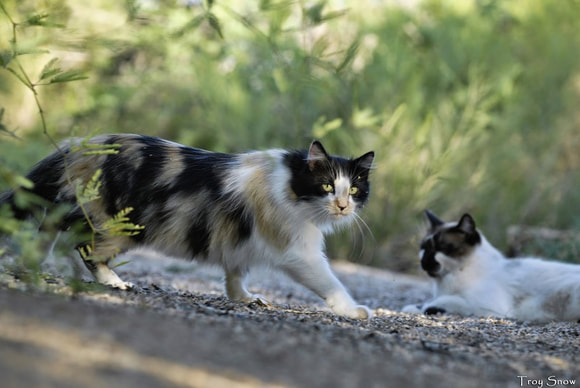2012 Feral Cat Survey
|
Since 1990 the mass killing of feral cats has become unpopular as more humane, nonlethal methods of control have shown to be more effective and less costly at controlling feral cat groups. In 2012, ACR conducted a national survey of feral cats groups. Some of the significant findings are highlighted below.
ACR’s President and Founder, Louise Holton stated, “This survey proves that Trap-Neuter-Return (TNR) works, and countless groups and individuals volunteer their own time and their own money to control and stabilize the nation’s feral cat population.” Holton continued, “We have come a long way since I started on this mission to promote TNR in 1990. Back then there was only a handful of forward-thinking groups and individuals working on implementing TNR in America. Today ACR found nearly 700 groups and we will be working on identifying more in the future.” |
Highlighted Findings |
Over 600 surveys were mailed and 120 groups in 37 states responded. Some interesting facts that came from the survey:
|
Most feral cat groups provide spay/neuter services to “owned” cats as well as offering TNR services for feral cats. This of course PREVENTS future groups from forming.
• Most (96%) of the TNR groups practice neuter-before-adoption for the stray cats they place in homes.
• If you need proof that many cats can live long lives in outdoor groups: One quarter of the groups report that their group cats are 6 to 8 years old. Thirty-five percent report their cats are between 9 and 12 years old, and over 14 % report feral cats 13 years old and some even older!
• Another good indicator as far as rabies and other health issues are concerned: 96% of the groups provide rabies vaccinations to feral cats; 64% provide distemper; 11.76% provide feline leukemia shots; 62.18% deworm feral cats; 63.87% provide flea treatment.
• One third reported that there were 26 to 30 kittens in each group before TNR; 42.86% said there were 0-5 kittens in groups after TNR.
• 71.42% said they had relocated some cats in their groups---this means an immediate drop in numbers of cats in groups, something that Alley Cat Rescue has experienced many times with our own groups.
• Sadly 61.34% said their local animal control agencies do NOT offer TNR and 36% said animal control agencies had trapped and killed whole groups in their areas. And as expected with trying total eradication, 27.73% said cats moved back into these areas where they were all trapped and killed, most within 2 to 3 months after the cats were removed. 2012-- Since 1990 the mass killing of feral cats has become
• Nearly all the groups (82.35%) educate the public about feral cats and TNR—65% say this has been “somewhat” effective, with 17.65% reporting their outreach programs to be extremely successful.
• In response to “working with animal control,” this answer was split between most saying this was “difficult,” a little less reporting “somewhat successful” and 21% reporting “positively.”
• Working on TNR with local city/government: Although only 15% found this easy to do, I think that is a positive indicator that we are moving in the right direction.
• Sadly 57% reported that it was “difficult” trying to work with their local wildlife groups.
• Most (96%) of the TNR groups practice neuter-before-adoption for the stray cats they place in homes.
• If you need proof that many cats can live long lives in outdoor groups: One quarter of the groups report that their group cats are 6 to 8 years old. Thirty-five percent report their cats are between 9 and 12 years old, and over 14 % report feral cats 13 years old and some even older!
• Another good indicator as far as rabies and other health issues are concerned: 96% of the groups provide rabies vaccinations to feral cats; 64% provide distemper; 11.76% provide feline leukemia shots; 62.18% deworm feral cats; 63.87% provide flea treatment.
• One third reported that there were 26 to 30 kittens in each group before TNR; 42.86% said there were 0-5 kittens in groups after TNR.
• 71.42% said they had relocated some cats in their groups---this means an immediate drop in numbers of cats in groups, something that Alley Cat Rescue has experienced many times with our own groups.
• Sadly 61.34% said their local animal control agencies do NOT offer TNR and 36% said animal control agencies had trapped and killed whole groups in their areas. And as expected with trying total eradication, 27.73% said cats moved back into these areas where they were all trapped and killed, most within 2 to 3 months after the cats were removed. 2012-- Since 1990 the mass killing of feral cats has become
• Nearly all the groups (82.35%) educate the public about feral cats and TNR—65% say this has been “somewhat” effective, with 17.65% reporting their outreach programs to be extremely successful.
• In response to “working with animal control,” this answer was split between most saying this was “difficult,” a little less reporting “somewhat successful” and 21% reporting “positively.”
• Working on TNR with local city/government: Although only 15% found this easy to do, I think that is a positive indicator that we are moving in the right direction.
• Sadly 57% reported that it was “difficult” trying to work with their local wildlife groups.

